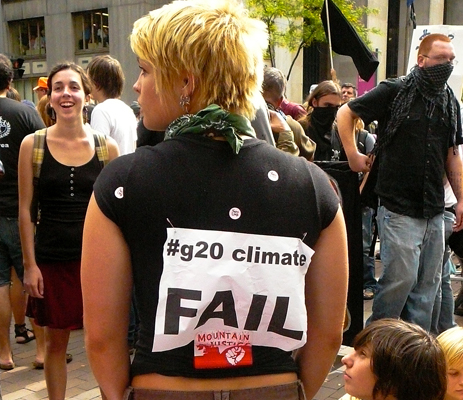 More on the spin cycle.Courtesy katiew via FlickrSay I’m a high-school drama teacher. My education and career experience are in teaching drama. I happen to have a side interest in mathematics and carry some unconventional theories about math. I tell the math department head at my high school that I want a say in drafting math curriculum. “Thanks for sharing,” she says. “But you’re a drama teacher. Get back to work.”
More on the spin cycle.Courtesy katiew via FlickrSay I’m a high-school drama teacher. My education and career experience are in teaching drama. I happen to have a side interest in mathematics and carry some unconventional theories about math. I tell the math department head at my high school that I want a say in drafting math curriculum. “Thanks for sharing,” she says. “But you’re a drama teacher. Get back to work.”
“Suppression!” says I. “I will not be silenced.”
Now let’s say there’s a think tank that wants to spread as much confusion as possible about mathematics, in hopes of keeping the public from understanding and supporting math legislation in Congress. The think tank picks up my story, feigns outrage, and feeds it to the media … and I’ve stretched this analogy to death.
This is essentially what happened with Alan Carlin, 72, a EPA career economist upset that his views on climate science weren’t getting due consideration. EPA scientists had listened to his opinion in the past, but when they excluded it from a report earlier this year, the Competitive Enterprise Institute jumped on the non-story and dressed it up as a “controversy.” In a maddening process we’ve chronicled over and over, journalists then reported on the “controversy” even though the story itself was weightless, sowing confusion just as the CEI must have wanted.
This all played out in June, with capable debunkery by NASA’s Gavin Schmidt, an actual climatologist, on RealClimate.org. Today the New York Times published a “closer look” at the Carlin story, relying on internal EPA docs obtained through Freedom of Information Act requests.
the newly obtained documents show that Dr. Carlin’s highly skeptical views on global warming, which have been known for more than a decade within the small unit where he works, have been repeatedly challenged by scientists inside and outside the E.P.A.; that he holds a doctorate in economics, not in atmospheric science or climatology; that he has never been assigned to work on climate change; and that his comments on the endangerment finding were a product of rushed and at times shoddy scholarship, as he acknowledged Thursday in an interview.
I suppose it’s not terrible that the Times batted down the story with even more evidence than there was before. At the same time, they put the utterly distracting episode back in the news.
There’s a tempting storyline in suggesting the Obama administration manipulates science to suit its own ideology, just as the prior administration did. In the guise of an evenhanded question, Times science writer Andrew Revkin suggests just this in a blog post highlighting the new Carlin story. But in the Carlin story, there’s no evidence to suggest this is happening.



